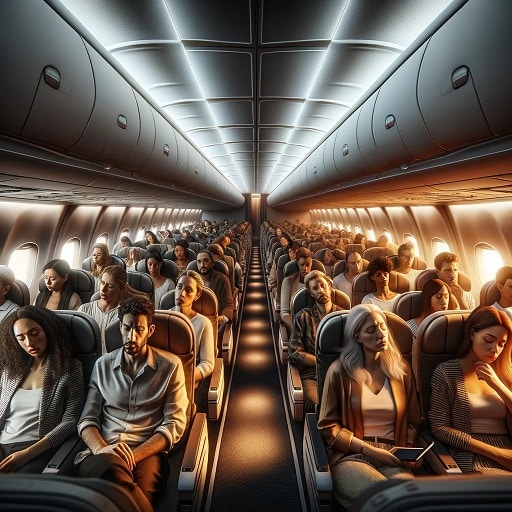For many, the allure of soaring through the skies can lose its luster when faced with the inevitable fatigue that accompanies air travel. The mystery of feeling drained after a flight is a common phenomenon, one that puzzles even seasoned travelers. But why does flying on a plane make you tired? It’s not just about adjusting your watch to a new time zone or the fact that we’re contending with an environment at 8,000 feet above the ground. There are several physiological and psychological reasons that contribute to that post-flight weariness.
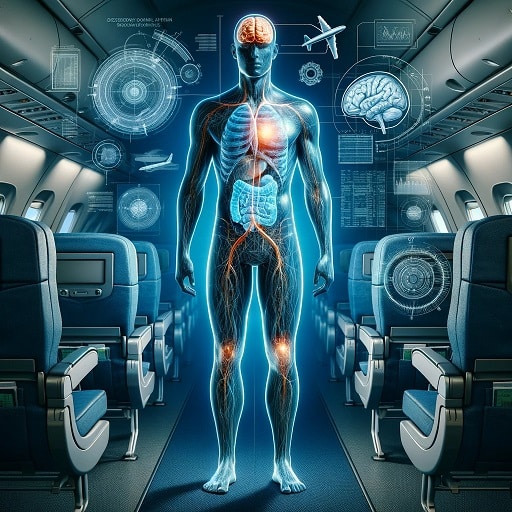
If you’ve ever wondered about the broader impact of traveling on our energy levels, you can read more about why traveling, in general, can be so exhausting.
Why Does Flying on a Plane Make You Tired?
Imagine you’re seated on a plane, excited for your upcoming trip, yet within hours, you feel exhausted. This section will explore the various factors, including oxygen levels, cabin pressure, and the peculiarities of airplane cabins, that unite to answer the titular question: why does flying on a plane make you tired?
When we fly, the cabin pressure simulates an environment similar to one found at higher altitudes – typically around 6,000 to 8,000 feet above sea level. This altitude adjustment affects the body, notably in terms of oxygen intake. The Federal Aviation Administration regulates the cabin pressure, but despite their efforts, passengers might still experience fatigue as a result of less oxygen being transported in their bloodstream.
Moreover, sitting still for several hours in confined airplane cabins restricts blood flow, and the associated lack of movement means that it’s harder for your blood to deliver oxygen throughout the body, exacerbating feelings of fatigue. Coupled with dry air and low humidity levels in the cabin air, which can lead to dehydration, these factors provide an initial understanding of why flying makes us feel tired.
Yet, air pressure inside the cabin and physical stress are just part of the story. We must also delve into the science behind jet lag, aquatic stress, and the mental fatigue of travel.
The Science of Air Travel and Fatigue
Air travel presents a unique set of environmental factors that can significantly impact our bodies. The effects begin with the basic, invisible force that envelops us at all times on the ground and up in the sky: air pressure.
Cabin Pressure and Oxygen Saturation
Airplane cabins are pressurized to an equivalent of 6,000 to 8,000 feet above sea level to maintain a balance between passenger comfort and the structural integrity of the aircraft. Even though cabin pressure is controlled to mitigate the effects of high altitude, oxygen saturation in the blood decreases. This reduced oxygen intake can lead to feelings of tiredness and is related to altitude sickness symptoms that one might experience at high mountain altitudes.
As flights navigate through various altitudes, the body must constantly adjust to changing levels of oxygen and pressure. This is an invisible but significant form of physical stress, with the body exerting additional energy to maintain essential functions amid lower oxygen levels.
The Impact of Sitting Still for Hours
A typical long-haul flight confines passengers to their seats for several hours, limiting the natural movement that helps keep blood flowing optimally throughout the body. Extended periods of sitting can contribute to the sluggish movement of blood, especially in the legs, which can make your extremities feel heavy and your whole body feel exhausted. The key to counteracting this is to ensure you stand up, stretch, and walk around whenever possible to keep your blood moving.
Circadian Rhythms and Jet Lag
Crossing multiple time zones during a flight confuses our internal body clock or circadian rhythm, which is attuned to the 24-hour day/night cycle. When you arrive at your destination, your brain might still be operating on your origin’s time, leading to jet lag. The misalignment between your internal clock and the local time can be a significant cause of fatigue, disrupting your ability to fall asleep or stay alert when you need to.
The science behind flying and fatigue is comprehensive, covering everything from the elevation you’re flying at to the way your body interacts with the environment inside an airplane. Understanding these factors is crucial in mitigating fatigue’s effects.
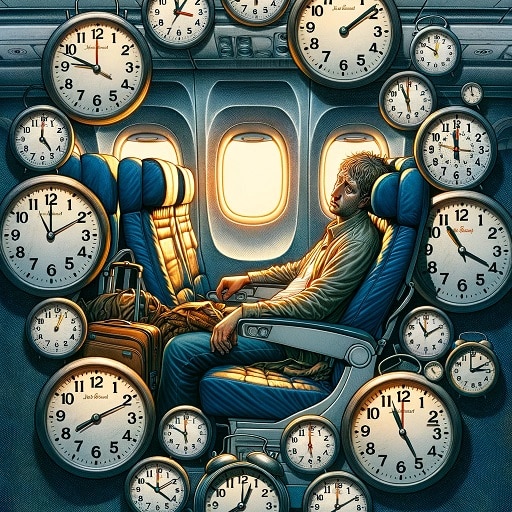
Psychological Factors Contributing to Flight Fatigue
Stress and Anxiety Associated with Air Travel
Traveling by plane often involves more than just sitting in a cabin; it includes navigating airports, adhering to schedules, and the possibility of encountering delays or other stressors. This anticipation or experience of stress and anxiety can drain one’s energy, leading to fatigue before even boarding the plane. For many, the lengthy procedures of checking in, going through security, and the hustle of airports can be mentally taxing, setting the stage for travel fatigue.
For those curious about similar psychological factors that can contribute to tiredness, find out why staying focused during a lecture might make you feel sleepy.
Sensory Overload in Airports and Airplanes
Air travel subjects passengers to a barrage of sensory input. From the constant hum of the aircraft engines to the fluctuating temperatures and brightness, these can intensify one’s sense of fatigue. The brain expends energy processing these stimuli, and over several hours, this sensory overload can leave passengers feeling tired and drained.
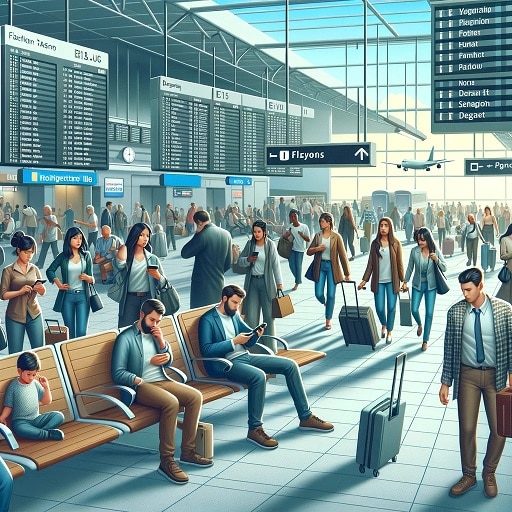
Dehydration and Dietary Choices
The Role of Cabin Humidity and Dehydration
The cabin air at cruising altitude tends to be very dry, with relative humidity levels often below those of some of the world’s driest deserts. The dry air onboard can hasten the loss of moisture from the body, exacerbating dehydration. When the body is dehydrated, it can lead to fatigue, as it forces the heart to work harder to pump oxygen and nutrients through the bloodstream.
Much like how spending time in the dry climate of a boat can leave you searching for a water bottle, dehydration while traveling by boat has similar effects on your well-being.
Effects of On-board Meals and Alcohol Consumption
Airplane food is often rich in sodium and preservatives, which can affect the body’s balance of fluids and lead to dehydration. In addition, drinking alcohol or caffeinated beverages like coffee can further contribute to the dehydration effects. That’s why nutritionists often recommend passengers to eat balanced meals before flying and avoid diuretic drinks to keep dehydration and resultant fatigue at bay.
Implementing strategies to counteract dehydration and manage dietary intake can significantly impact how tired one feels during and after a flight.
Strategies to Improve Sleep and Reduce Fatigue
Good preparation and in-flight practices are essential for maintaining your energy levels and minimizing the impact of flying on your sleep and overall well-being.
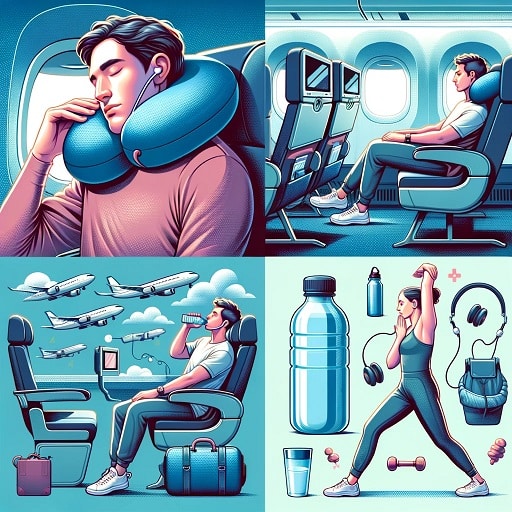
Pre-flight Planning for Better Sleep
Your journey to a well-rested flight begins even before you reach the airport. Ensure that you have a good night’s sleep prior to embarking on your trip. If possible, try to gradually adjust your sleep schedule a few days before your flight to match the time zone of your destination. This preemptive measure can help mitigate jet lag’s effects.
Part of preparing for your trip might also involve maximizing sleep quality before a flight, which could mean evaluating your sleeping surface at home.
Methods to Stay Hydrated and Nutrition Tips
To combat the low humidity and dry air within the cabin, make it a priority to drink plenty of fluids. While water is the best choice to stay hydrated, incorporating beverages like coconut water or electrolyte-infused drinks can also help maintain your body’s fluid balance. Moreover, it’s best to avoid excessive amounts of alcohol and caffeine, which can exacerbate dehydration.
Eating balanced meals with ample amounts of fruits and vegetables before and during your flight can also help maintain energy levels. Meals that are high in complex carbohydrates and protein can provide a steady release of energy as your body digests them during flight.
On-board Exercises and Stretching to Improve Circulation
Long periods of inactivity can cause your blood to pool, particularly in your legs, which can lead to fatigue and discomfort. Simple on-board exercises, such as rotating your ankles, walking down the aisles, or doing some gentle stretches, can help keep your blood flowing and reduce the risk of fatigue.
Incorporating these strategies into your travel routine can be a game-changer in how you feel during and after your flights.
Post-Flight Recovery Techniques
Touching down after a long flight delivers a sense of relief. However, the journey to revitalizing your energy levels is still underway. Here’s how to expedite the post-flight recovery process and adjust to your new environment.

Adjusting to New Time Zones and Maintaining Sleep Hygiene
One of the most immediate challenges upon landing is adapting to new time zones. To reset your internal clock, try to get sunlight exposure as it can help your body adjust to the local time. In addition, maintain a consistent sleep schedule and create a restful environment that promotes sleep. Even if you feel the need to nap due to sleep deprivation, be mindful of the duration; long naps can further disrupt your sleep pattern.
For those interested in exploring fresh air’s puzzling effect on our energy levels, the relationship between spending time outdoors and tiredness should not be overlooked.
Relaxation Techniques and the Importance of Daylight Exposure
Engaging in relaxation techniques such as deep breathing exercises, meditation, or listening to calming music can alleviate stress and help your body unwind. Pair this with activities like taking a walk in fresh air to combine relaxation with the physical benefits of exercise, which can improve blood oxygen levels after being in the pressurized cabin environment.
When to Seek Medical Advice for Post-Flight Fatigue
While it’s normal to feel tired after a long flight, if you notice persistent fatigue or symptoms such as severe sleep disruption, it’s advisable to seek medical advice. Your healthcare provider can help determine whether the fatigue is travel-related or indicative of another health condition.
Post-flight recovery is an essential component of travel, especially for those looking to enjoy their trip to the fullest or return to their daily routine without missing a beat.
Conclusion
Why does flying on a plane make you tired? As we’ve explored, this tiredness is the cumulative result of various factors, ranging from the reduced oxygen levels at cabin altitude and the physical inactivity during long flights, to hydration challenges and the psychological toll of travel. Understanding how these elements interact can empower us as travelers to take proactive steps in managing our health and comfort during our flight.
While it’s impossible to completely avoid fatigue associated with air travel, adopting the strategies discussed—from pre-flight sleep preparation, staying hydrated with plenty of fluids, to post-flight recovery techniques—can significantly alleviate the symptoms, allowing for a more enjoyable and restful journey.
FAQs
Why do I feel exhausted even if I sleep during the flight?
Sleeping on a plane is often not as restorative as sleep on the ground due to factors such as the upright position, interrupted sleep cycles, noise, and changes in air pressure and oxygen levels. These disrupt your body’s natural sleep rhythm, leading to a feeling of exhaustion despite periods of sleep.
This phenomenon resembles the strange dynamics of feeling more tired after prolonged rest, such as what happens after a lie-in on the weekend.
Could the reason for my flight fatigue be medical?
While flight fatigue is most often related to the travel experience itself, in some cases, it may exacerbate underlying medical conditions like anemia or thyroid issues. Persistent or severe fatigue should be evaluated by a healthcare professional.
How long does it typically take to recover from post-flight fatigue?
Recovery time can vary depending on the length of the flight, the number of time zones crossed, and individual factors. Generally, it may take one to three days to adjust after a long flight, but proper hydration, nutrition, and sleep can help shorten this period.
